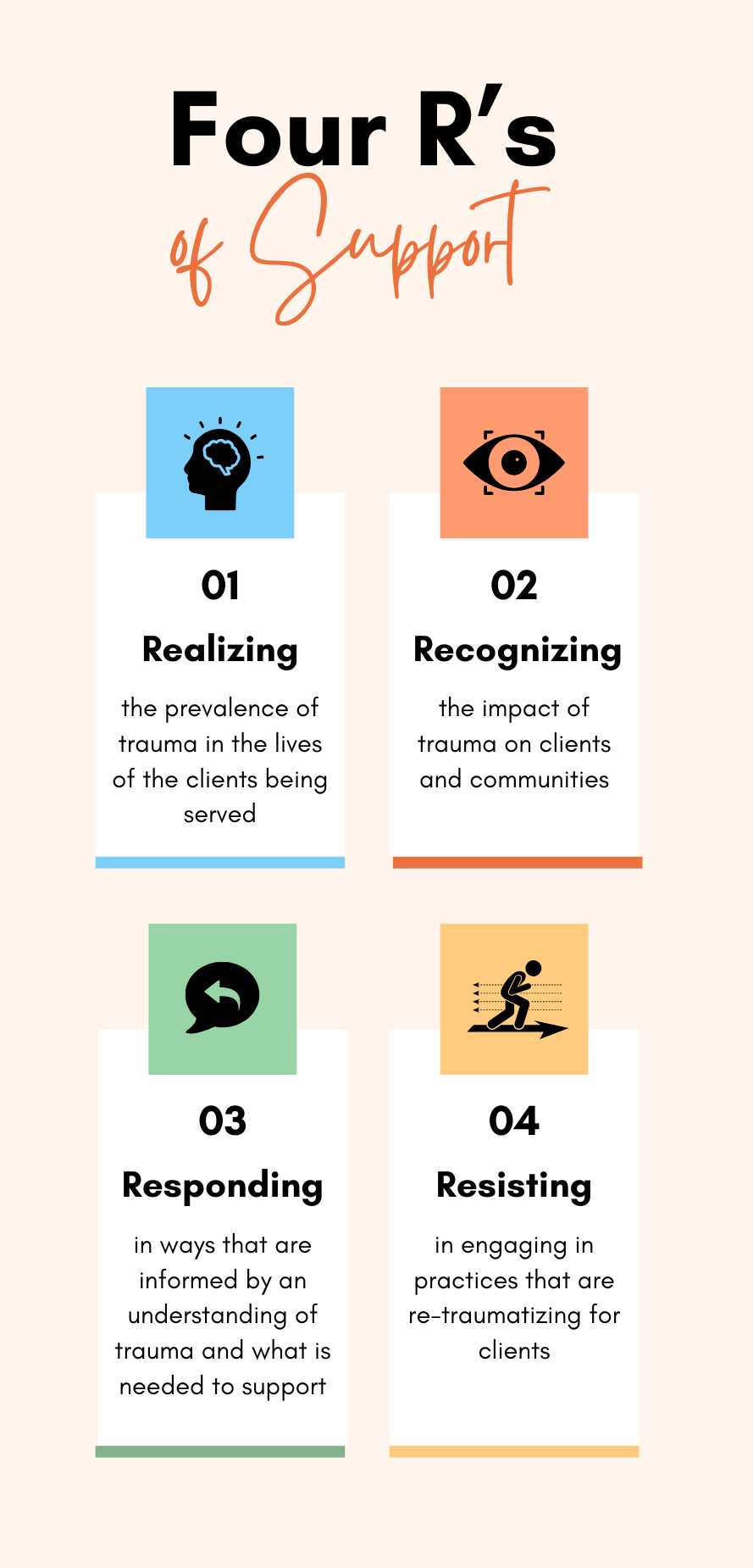Blog > Treatment Strategies > Exploring the Real Connections Between Trauma and Addiction and Loss
Exploring the Real Connections Between Trauma and Addiction and Loss
Explore the complex relationship between trauma, addiction, and loss—how they intertwine, reinforce each other, and impact the healing journey. Designed for mental health professionals, this piece offers insight into trauma-informed strategies that support recovery and resilience.

Last Updated: April 7, 2025


What You'll Learn
- How trauma, addiction, and loss are interconnected and often reinforce one another
- Why unresolved grief can complicate recovery and fuel substance use
- The importance of trauma-informed care and culturally sensitive approaches in treatment
- Practical strategies to help clients build resilience and break the cycle of addiction
Marcie experienced childhood trauma after witnessing her father’s sudden death in a car accident when she was just 8 years old. This traumatic event, along with a history of neglect, led to feelings of abandonment and a deep fear of loss. As Marcie grew older, she began using alcohol and later opioids to numb her emotional pain. At 28, she lost her mother to cancer, which intensified her struggles with grief and addiction. Marcie’s grief, combined with a lack of coping mechanisms, led to more frequent substance abuse and a spiraling emotional state.
Trauma and Addiction: A Hidden Struggle
Trauma, addiction, and loss are deeply intertwined aspects of the human experience. They often feed off each other, creating a cycle that can feel impossible to break. Whether it’s the pain of childhood trauma, the numbing effects of addiction, or the devastating grip of loss, these experiences can leave lasting scars. Understanding the relationship between these elements is the first step toward healing.
For some, trauma may also lead to a sense of disconnection from others or the world around them. This disconnection can give rise to coping mechanisms, often in the form of addiction. Unresolved loss can exacerbate the symptoms of trauma and further embed a person in their addiction.
Dr. Gabor Mate, an internationally renowned expert in trauma, expresses this sentiment in the following quote, “Ask not why the addiction, but why the pain.” He expands on this perspective by asserting that lack of connection is the fuel for addiction, and encourages the exploration of the connections between addiction, trauma, and loss in his powerful video “How Childhood Trauma Leads to Addiction”.
Phoenix Center for Experiential Trauma Therapy in Pennsylvania shares sobering statistics which highlight the significant relationship between trauma and addiction. Consider that:
- 80% of women seeking treatment for addiction report a history of physical or sexual assault
- 70% of young people seeking treatment for addiction report a history of trauma
- Men with Substance Use Disorder are seven times more likely to experience PTSD
- Women with Substance Use Disorder are twelve times more likely to experience PTSD
Dr. Bruce Perry echoes the sentiments of Dr. Mate in his perspective that children have six core needs as described below:
- ATTACHMENT: being able to form and maintain healthy emotional bonds and relationships
- SELF-REGULATION: containing impulses, the ability to notice and control primary urges as well as feelings such as frustration
- AFFILIATION: being able to join and contribute to a group
- ATTUNEMENT: being aware of others, recognizing the needs, interests, strengths and values of others
- TOLERANCE: understanding and accepting differences in others
- RESPECT: finding value in differences, appreciating worth in yourself and others
What happens when children like Marcie don’t experience all these needs? They often develop vulnerabilities which make them more susceptible to the lure of addiction as a “warm, soft hug” which comforts them in ways that they have not experienced before. Addiction can take many forms: alcohol, drugs, gambling, overeating, and more. This behavior is typically an attempt to alleviate the emotional turmoil caused by trauma, but it doesn’t resolve the underlying issues. In fact, addiction often exacerbates pain, creating a vicious cycle where the person feels both the emotional devastation of trauma and the physical and psychological consequences of their addictive behaviors.
For instance, someone who experienced emotional abuse as a child might develop a dependence on alcohol to numb the pain. Over time, this substance use can lead to more serious issues, including physical health problems, legal troubles, strained relationships, and financial ruin. But the root cause—the trauma—remains unresolved.
Trauma and addiction are both physical and psychological. The body does in fact keep the score, just as the body can change the score thanks to effective psychotherapy interventions and neuroplasticity. The brain and nervous system can engage in a phenomenal experience of repair and reconnection, which can be the catalyst needed for our clients to overcome addiction, trauma, and loss. It is important to note that addiction is not simply a form of self-destruction. It is often a misguided attempt to regain control over an uncontrollable situation or to cope with feelings that seem too overwhelming to face. Understanding addiction in this context helps to recognize it as a symptom of unresolved trauma, rather than a moral failing or weakness.
The criminal justice system has certainly viewed addiction as a moral or legal failing of the individual, especially in people of color, where we see disproportionate numbers of non-White individuals criminally penalized for their relationship with substances. Clinicians can challenge this assumption by utilizing a trauma-informed and person-centered approach while also viewing the role of cultural identity as pivotal to a person’s experience with addiction. We also benefit from the perspective of Marta Green, a Mental Health Specialist at Riker’s Island Prison in New York City, who says:
“You cannot mourn in jail. You have to be macho…any sign of weakness and you will be beaten, robbed or raped. The energy blocked from mourning goes to violence instead. The jails are violent because they contain frightened men and women who have been deprived of the numbing power of drugs that so many are used to as a means of not feeling. If they had the safety to mourn, they might have a chance to learn other means of coping, but the jail culture does not allow for this.”
Want to Deliver Truly Trauma-Informed Care?
Download our Trauma-Informed Care Checklist
Whether you’re a seasoned therapist or just integrating trauma-informed practices, this checklist is a simple, powerful tool to keep your care aligned with best practices and client needs.
Loss is a universal human experience for everyone at some point in each of our lives. Grief and trauma go hand in hand, and as clinicians we understand the role of loss in addiction and trauma. For someone struggling with both trauma and loss, addiction becomes a way to escape the overwhelming emotions associated with these experiences. It becomes a way to delay the inevitable confrontation with grief, but in doing so, it prolongs the pain and makes it more difficult to heal.
The bereavement process among patients diagnosed with substance use disorder is an observed reality in clinical practice. Substance use and bereavement are related and common themes: untreated grief might impact high-risk behavior and substance use and recovery treatment outcomes. Loss of family members, overdose, suicide, and family relationships are unfortunate yet common events in families affected by substance use disorders.
To fully understand the synchronicity between trauma, addiction, and loss, we must view addiction and trauma as a cyclical relationship. Trauma and loss leave one vulnerable to experiencing addiction, and addiction leaves one more vulnerable to experiencing further trauma and loss.
Loss and Its Impact on Trauma and Addiction
A trauma-informed approach reminds us of the four R’s necessary to support individuals in their journey towards healing and growth:
(1) Realizing the prevalence of trauma in the lives of the clients being served;
(2) Recognizing the impact of trauma on clients and communities;
(3) Responding in ways that are informed by an understanding of trauma and what is needed to support recovery and resilience;
(4) Resisting in engaging in practices that are re-traumatizing for clients.
As clinicians prepare to support clients who have experienced addiction, trauma, and loss, we are guided by treatment targets that highlight the importance of a multi-faceted approach that views the client as a whole person with strengths, abilities, ideas, resources, and resilience. For many, key stages of trauma recovery include safety & stabilization, mourning and remembrance, and reconnection. Recommended treatment targets include:
- Learning to create healthy boundaries
- Maintaining honest communication with friends, family, and professionals
- Attending individual and group therapy and support group meetings
- Creating a relapse prevention plan
- Joining continuing or aftercare programs
- Utilizing evidence-based modalities, like Cognitive Behavioral Therapy (CBT) and Eye Movement Desensitization and Reprocessing (EMDR)
- Increasing safe and healthy relationships and connections
- Acknowledge the trauma and taking the steps necessary to heal
- Engaging in grief work to move through the four tasks of mourning
- Connecting with other people in a cycle of trauma and addiction for further support
Finally, a key area for growth in many individuals will be learning to ask for help. Asking for help is a vulnerability that most people affected by trauma are not comfortable with. Therefore, clinicians should aim to explore a client’s “help-seeking framework” by exploring the following questions together:

Breaking the Cycle: Steps Toward Healing and Growth
Discussion:
- "What do you most want help with?"
- "Why is asking for help such a crucial coping skill?"
- "Was there a time recently when you needed to call someone for help, but didn't?"
- "Is it harder to ask for help with your PTSD, your substance abuse, or both equally?"
- "Why might PTSD and substance abuse make it hard for you to ask for help?"
- "What happens when you do not ask for help?"
- "Are there any successes you've had in asking for help? What made those possible?"
- "Do you think you can learn to ask for more help?"
- "How can you cope if the other person refuses to help?"
- "If you feel an impulse toward a destructive behavior, do you know whom you would call and what you would say?"
- "Why would asking for help make you more independent in the long run?"
- "Can you 'coach' the other person in advance on what you want him or her to say?"
Let’s all embrace the concept of trauma resilience as we support clients who have been impacted by trauma, addiction, and loss. Trauma resilience encourages new possibilities, increased strength, more meaningful relationships, greater appreciation, and spiritual development. The relationship between trauma, addiction, and loss is complex, and the road to healing is never simple. However, by understanding how these experiences intersect, we can begin to unravel the pain and find pathways to recovery. Acknowledging the trauma, seeking support, practicing self-compassion, and engaging in healing practices are all essential steps on the journey.
Although the pain of trauma, addiction, and loss may never fully disappear, healing is possible. By breaking the cycle, individuals can rediscover their strength, rebuild their lives, and find hope for a brighter future. As the French philosopher Albert Camus remarks, “In the midst of winter, I found there was, within me, an invincible summer. And that makes me happy. For it says that no matter how hard the world pushes against me, within me, there’s something stronger — something better, pushing right back.”
How ICANotes Supports Clinicians Treating Trauma, Addiction, and Loss
Treating clients who are navigating the complex intersections of trauma, addiction, and loss requires not only clinical skill and compassion—but also thorough, accurate, and organized documentation. ICANotes is specifically designed for behavioral health professionals, offering powerful tools that support trauma-informed care and person-centered treatment planning.
With ICANotes, clinicians can:
-
Document with depth and precision: The rich, template-driven notes in ICANotes allow clinicians to clearly capture trauma histories, grief narratives, and addiction patterns. Notes reflect client progress over time and support the nuanced documentation often required in cases involving co-occurring disorders.
-
Easily track treatment targets and modalities: Whether you're incorporating evidence-based approaches like CBT, EMDR, or grief counseling, ICANotes makes it easy to track interventions, goals, and client responses. Treatment plans are customizable and align with trauma recovery stages such as safety, mourning, and reconnection.
-
Support compliance and reimbursement: Behavioral health documentation often needs to meet specific standards for insurance and auditing purposes. ICANotes ensures that notes are complete, clinically sound, and defensible—supporting not only clinical outcomes, but also financial sustainability.
-
Streamline collaboration and continuity of care: For clients affected by trauma, addiction, and loss, continuity of care is essential. ICANotes supports integrated care by enabling seamless sharing of treatment summaries and progress notes across multidisciplinary teams, when appropriate.
-
Honor the whole person: Built to reflect the values of trauma-informed practice, ICANotes helps clinicians highlight client strengths, resilience, and goals—not just symptoms. This approach supports the therapeutic alliance and reinforces a respectful, empowering model of care.
In clinical practice, tools like ICANotes do more than save time—they help clinicians stay present and focused during sessions, knowing that their documentation system supports both best practices and compassionate care. In the journey toward healing, clarity and consistency matter—and ICANotes is there to help clinicians make every note count.
Get Your Free 30-Day Trial (no credit card required!)
Related Posts
Diane Bigler, LCSW, LSCSW, is a Licensed Clinical Social Worker in Missouri and Kansas with over 25 years of experience in the mental health field. She has held clinical positions as an outpatient and in-home therapist and clinical supervisor in diverse settings. Diane was an Adjunct Professor of Social Work for 10 years at The University of Kansas, School of Social Welfare and a Field Liaison and Field Instructor. She has also held administrative positions as a Program Director and Coordinator. Diane is a popular local and national trainer on a wide variety of mental health and workplace development topics for clinicians and corporations and has facilitated over 500 training courses in the last few years. Diane is most passionate about providing quality professional development to clinicians, employees, and leaders.








